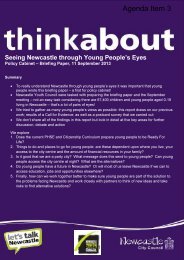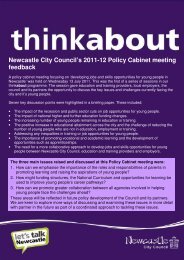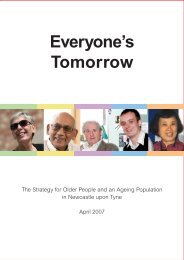NEWCASTLE'S MUSICAL HERITAGE AN INTRODUCTION By ...
NEWCASTLE'S MUSICAL HERITAGE AN INTRODUCTION By ...
NEWCASTLE'S MUSICAL HERITAGE AN INTRODUCTION By ...
Create successful ePaper yourself
Turn your PDF publications into a flip-book with our unique Google optimized e-Paper software.
CHAPTER FIVE<br />
THE GR<strong>AN</strong>D MUSIC FESTIVALS<br />
One of the prominent features of musical life across the country during 18 th<br />
and 19 th centuries was the Grand Music Festival. The occasional event when the<br />
big choral works of Handel were presented by augmented choirs with orchestra<br />
in the church and lighter instrumental and vocal entertainments were laid on in<br />
the evenings with perhaps a ball or some other social event to round off the<br />
festival. The most famous of these festivals was the ‘Three Choirs’ at Worcester,<br />
Gloucester and Hereford in turn from around 1715. Birmingham started their<br />
festivals in 1768, Norwich in 1770 and Sheffield in 1786. Newcastle’s first Music<br />
Festival took place in 1778 and they continued at irregular intervals until 1842.<br />
After a lapse of thirty-five years, following the 1842 Festival, an article appeared<br />
in the local press which began as follows; -<br />
‘It has been a surprise to some who are in the habit of lamenting the inferiority<br />
of Newcastle to such towns as Leeds and Birmingham in the matter of triennial<br />
Musical Festivals, to find that more than a century ago the capital of Tyneside set<br />
the example to many towns that have since wrested the palm of musical preeminence<br />
from her. It may be interesting, in view of the proposed resumption of<br />
our local Musical Festivals, to recount, so far as existing chronicles permit, the<br />
cardinal incidents in regard to those great occasions when, according to current<br />
criticisms, “an immense concourse” of the nobility and gentry came together from<br />
the “neighbouring counties” and “a crowd of beauty and fashion thronged the<br />
streets”: when special steam-packets were run on the river, and inns and<br />
lodging-houses were so hard pushed to provide accommodation that a single<br />
night’s rest could not be obtained for less than four guineas.’<br />
To some extent the above introduction to the 1877 newspaper article captures<br />
the essence of what these festivals were all about. Grand music spectacles, laid<br />
on to impress; employing large forces of mainly imported talent at great expense<br />
and attended by the upper crust of local society. Initially, they appear to have<br />
been largely self sponsored by those organizing and performing in the festival,<br />
but later it was thought that local businesses and tradesmen, who together with<br />
local landlords had welcomed the influx of people into the town for obvious<br />
reasons, should contribute part of the profits they made from the festival to the<br />
cost of the festival. Some of these Grand Music Festivals held in Newcastle<br />
made a profit and where they did part of it went to charitable causes. Why the<br />
Grand Music Festivals ceased to be held in Newcastle is not recorded (the<br />
festival referred to in the above newspaper article would have been a lower key<br />
29

















